

Causes of social Isolation among elderly. Loneliness and cognitive function in the older adult A systematic review. How Social Isolation Affects the Brain. Daisy Fancourt was at her home in Surrey in southeast England when the UK government formally announced a nationwide lockdown.
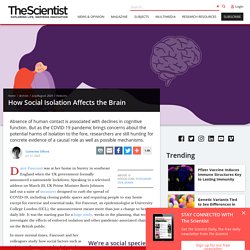
Speaking in a televised address on March 23, UK Prime Minister Boris Johnson laid out a suite of measures designed to curb the spread of COVID-19, including closing public spaces and requiring people to stay home except for exercise and essential tasks. For Fancourt, an epidemiologist at University College London (UCL), the announcement meant more than just a change to her daily life. It was the starting gun for a huge study, weeks in the planning, that would investigate the effects of enforced isolation and other pandemic-associated changes on the British public.
We’re a social species. We really need others to survive. In more normal times, Fancourt and her colleagues study how social factors such as isolation influence mental and physical health. . © istock.com, Maria Zamchy. Social isolation amid COVID-19 pandemic boosts risk of dementia in older adults. Physical pain is unpleasant, yet it’s vital for survival because it’s a warning that your body is in danger.
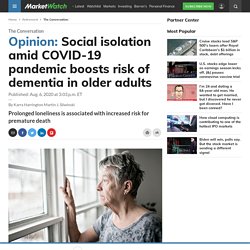
It tells you to take your hand off a hot burner or to see a doctor about discomfort in your chest. Pain reminds us all that we need to take care of ourselves. Feeling lonely is the social equivalent to feeling physical pain. It even triggers the same pathways in the brain that are involved in processing emotional responses to physical pain. Just like feeling physical pain, feeling lonely and disconnected from others is also a signal that we need to take care of ourselves by seeking the safety and comfort of companionship. Perceived Social Isolation and Cognition. Covid-19 Measures, Loneliness and Depression. Life in isolation isn’t that much fun.
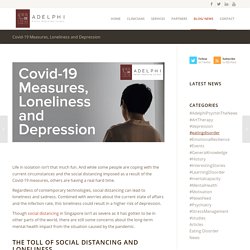
And while some people are coping with the current circumstances and the social distancing imposed as a result of the Covid-19 measures, others are having a real hard time. Regardless of contemporary technologies, social distancing can lead to loneliness and sadness. Combined with worries about the current state of affairs and the infection rate, this loneliness could result in a higher risk of depression. Though social distancing in Singapore isn’t as severe as it has gotten to be in other parts of the world, there are still some concerns about the long-term mental health impact from the situation caused by the pandemic. Social isolation, loneliness in older people pose health risks. Human beings are social creatures.
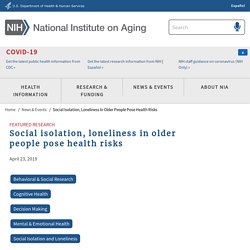
Loneliness and Social Isolation Linked to Serious Health Conditions. Social isolation was associated with about a 50% increased risk of dementia and other serious medical conditions.
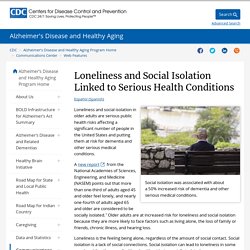
Loneliness and social isolation in older adults are serious public health risks affecting a significant number of people in the United States and putting them at risk for dementia and other serious medical conditions. A new reportexternal icon from the National Academies of Sciences, Engineering, and Medicine (NASEM) points out that more than one-third of adults aged 45 and older feel lonely, and nearly one-fourth of adults aged 65 and older are considered to be socially isolated.1 Older adults are at increased risk for loneliness and social isolation because they are more likely to face factors such as living alone, the loss of family or friends, chronic illness, and hearing loss. Loneliness is the feeling being alone, regardless of the amount of social contact. Health Effects of Social Isolation and Loneliness – Aging Life Care Association™
Clifford Singer, MD Adjunct Professor, University of Maine Chief, Geriatric Mental Health and Neuropsychiatry Acadia Hospital and Eastern Maine Medical Center 268 Stillwater Avenue Bangor Maine 04402 207.973.6179 csinger@emhs.org Cliff Singer is a geriatrician and psychiatrist.
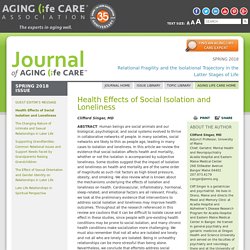
He lives in Orono, Maine and directs the Mood and Memory Clinic at Acadia Hospital and Alzheimer’s Disease Research Program for Acadia Hospital and Eastern Maine Medical Center in Bangor. He trained in general psychiatry and geriatric medicine at Oregon Health and Science University and served on the faculties of psychiatry and neurology there and at the University of Vermont before moving to Maine in 2010. Clifford Singer, MD. Isolating the Elderly Is Bad for Their Health. A Review of Social Isolation: An Important but Underassessed Condition in Older Adults. The risks of social isolation.
Overview CE credits: 1 Learning objectives: After reading this article, CE candidates will be able to: Identify the effects of social isolation and loneliness on physical, mental and cognitive health.Explore how loneliness differs from social isolation.Discuss evidence-based interventions for combating loneliness.
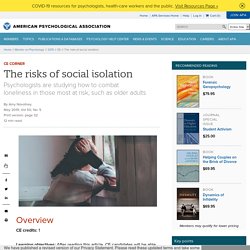
For more information on earning CE credit for this article, go to www.apa.org/ed/ce/resources/ce-corner.aspx. According to a 2018 national survey by Cigna, loneliness levels have reached an all-time high, with nearly half of 20,000 U.S. adults reporting they sometimes or always feel alone. COVID-19 and the consequences of isolating the elderly - The Lancet Public Health. As countries are affected by coronavirus disease 2019 (COVID-19), the elderly population will soon be told to self-isolate for “a very long time” in the UK, and elsewhere.
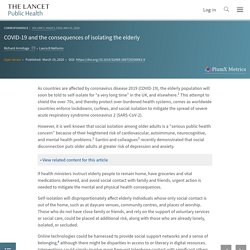
BBCCoronavirus: isolation for over-70s ‘within weeks’. This attempt to shield the over-70s, and thereby protect over-burdened health systems, comes as worldwide countries enforce lockdowns, curfews, and social isolation to mitigate the spread of severe acute respiratory syndrome coronavirus 2 (SARS-CoV-2). However, it is well known that social isolation among older adults is a “serious public health concern” because of their heightened risk of cardiovascular, autoimmune, neurocognitive, and mental health problems. Gerst-Emerson K Jayawardhana J Loneliness as a public health issue: the impact of loneliness on health care utilization among older adults.
Am J Public Health. 2015; 105: 1013-1019. Loneliness & Isolation. Coronavirus: Elderly hit hard by social isolation amid circuit breaker measures, Health News. Social isolation and the elderly poor in Singapore. SINGAPORE: Her one-room flat was a cluttered mess, and Madam Helen Fernandez herself never seemed to bathe, said her neighbours who always saw her in the same set of clothes.
When case workers first visited the unkempt and confused elderly widow, they had to rush her to hospital for very high blood pressure – which resulted because she hadn’t been taking her medication and had been missing doctors’ appointments. Since her husband died 17 years ago, Mdm Fernandez had been living alone with no friends or family – and slowly falling prey to loneliness and dementia. There were times when she’d even call up the police just to talk. It was how her case got referred to the Social Service Office, and then to case worker Ahmala Rajoo in 2015. “She was receiving financial assistance, about S$500 a month,” said Ms Ahmala, a care executive with NTUC Health Cluster Support in Bukit Merah. Seniors felt less socially satisfied, more isolated during Covid-19 circuit breaker period: Survey, Singapore News. SINGAPORE - Social isolation during the circuit breaker period resulted in lower social satisfaction levels for senior citizens, according to results from a monthly survey of about 7,500 people aged between 55 and 75 here.
Social satisfaction levels dipped by about 4 per cent in May when compared with data from January. In particular, for senior citizens living with others, satisfaction levels fell to the pre-circuit breaker levels of peers living alone, while those living alone saw even lower satisfaction levels as safe distancing measures made it more difficult to find support from friends and the community.
As of July, while satisfaction levels have rebounded after the circuit breaker period, which was from April 7 to June 1, they are not back to the levels they were at before. As Singapore's population ages, the proportion of those who remain single and live alone will increase, said Prof Straughan, a sociologist and former Nominated Member of Parliament.
14 Ways to Help Seniors Avoid Social Isolation - A vast body of evidence demonstrates the physical benefits of a healthy social life.
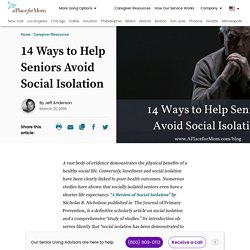
Conversely, loneliness and social isolation have been clearly linked to poor health outcomes. Numerous studies have shown that socially isolated seniors even have a shorter life expectancy. Interventions to reduce social isolation and loneliness among older people: An integrative review. Abstract.

10 Ways to Help Seniors Deal with Isolation and Depression – DailyCaring. Many seniors go through major life changes that could make them more vulnerable to depression. But it’s heartbreaking to stand by and watch someone deal with depression or loneliness on their own. Zara Lewis shares 10 ways you can help your older adult cope with symptoms and improve their quality of life. According to WHO estimates, depression affects about 350 million people of all ages worldwide. While coping with depression is tough, it’s even more difficult to watch an aging family member struggle with it. Ways of Preventing Social Isolation Among Seniors.
As seniors age, their lives can become more isolated. Their families are no longer at home with them, and they may begin to isolate themselves from the outside world because it has become more difficult for them to get out. Social isolation among seniors can also impact their health. A study by the Proceedings of the National Academy of Sciences showed that seniors have a 26 percent higher death risk than the elderly that remain social. How to avoid elderly loneliness during COVID: Tips to stay socially active. The risk for the severe form of COVID-19 increases with age, so like many older adults, Katharine Esty spent many weeks this spring without leaving her home at all. Esty, who turns 86 this week, knows all too well the toll such self-isolation can take on mental health.
She’s still a practicing psychotherapist who helps patients cope with life — though the sessions are now by phone as the coronavirus outbreak grips the country. Esty has stayed “amazingly healthy,” she said, in part because her busy schedule and the company of her live-in partner Peter, whom she met after her husband of 59 years died, made the quarantine easier. “But there are lots of people who are alone and it’s been really hard… it’s just devastating,” Esty, who lives in a retirement community in Concord, Massachusetts, told TODAY. Addressing Social Isolation Among Seniors. A Self-Care Guide for Caregivers.
If you are a caregiver, you probably realise that yours is a role which is often critical but also invisible in our society. When you get together as a family, or meet acquaintances, our friends and family all tend to focus on the comfort and the feelings of the patient. They assume that caregivers, who are often a loving spouse, child or even a parent or sibling, are happy in the role and able to cope. And so, our feelings as the caregiver tend to become “invisible” to everyone. It’s also often the case that we, as caregivers are just as likely as everyone else to downplay our own needs and neglect our health in order to continue to focus on our patient.
Acknowledge the Importance of Keeping Yourself Healthy The first step you need to take is to acknowledge that your health is just as important as the person for whom you are caring for. Caregiver burnout tips! Caregiving Burnout: What It Is and How to Talk About It. Caring for a loved one can be stressful, and that stress can have a considerable impact on a caregiver’s personal health and well-being.1 Even so, some caregivers hesitate to bring up the strain they're under for fear they'll make their loved one feel guilty or look like they aren't strong enough or together enough to handle their responsibilities.
But talking about burnout is an important part of protecting yourself against it. Here are some talking points you can use to discuss burnout with the loved one you're caring for as well as with other friends and relatives. Understanding Caregiving Burnout Caregiving burnout is when a caregiver becomes physically, mentally, and emotionally exhausted. It’s the kind of tired you can’t fix with a single good night’s sleep, and it’s often the result of long-term, unchecked stress. Why Caregiving Burnout Happens Caregivers can focus so much on their loved one that they don’t (or can’t) take time to care for themselves.